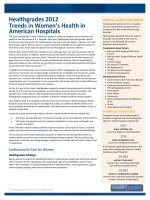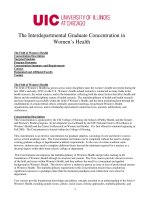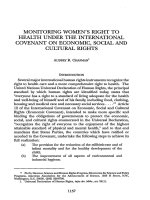WEPs Call to Action Investing in Women's Right to Health Company Annex
Bạn đang xem bản rút gọn của tài liệu. Xem và tải ngay bản đầy đủ của tài liệu tại đây (566.7 KB, 4 trang )
Company and Partnership Examples
Sector
Company/
Organization
Challenge
Financial
Banco de
Brazil
Workplace
Policies
Banco do Brasil was the first financial institution in Brazil to allow women
employees six months maternity leave on full pay, which is also available if
adopting children under eight years. They have exceeded Brazilian national
requirements of 120 days for paid maternity leave, by more than six weeks.
Additionally, women are entitled to return to the same job they were holding
before leave, in order to avoid adverse effects on their career advancement. Learn
more here.
Chamber of
Commerce
The
Bangladesh
Women
Chamber of
Commerce
and Industry
(BWCCI)
Business for
Social
Responsibility
(BSR) and The
Global Alliance
for Improved
Nutrition
(GAIN)
Lack of
Access to
Relevant
Health
Information
BWCCI raises awareness about cervical cancer by disseminating information about
cervical cancer and its prevention to 30,000 Bangladeshi women through leaflets,
letters, counseling, hotline centers, training programs, meetings, and roundtables
by 2016. Learn more here.
Malnutrition
BSR and GAIN commit to help improve nutrition and reduce anemia among girls in
late adolescence and women of reproductive age, working in the garment
industry in Dhaka, Bangladesh. The three-year program will develop an
intervention model that combines food supplementation, behavior change
interventions, empowerment of workers to request and utilize quality health and
nutrition services, and advocacy for better breastfeeding opportunities and child
care facilities in the workplace. Learn more here.
MultiStakeholder
Partnership
Every Women
Every Child
MultiChallenge
Every Woman Every Child (EWEC) is an unprecedented global movement that
mobilizes and intensifies international and national action by governments,
multilaterals, the private sector and civil society to address the major health
challenges facing women and children around the world. The movement puts into
action the Global Strategy for Women’s and Children’s Health, which presents a
roadmap to improve the health of the most vulnerable women and children. A
growing number of businesses have made commitments to EWEC and are actively
working to improve women and children’s health. Learn more here.
Technology
Intel and the
United Nations
Population
Fund (UNFPA)
Lack of
Human
Resources for
Health
In an effort to combat the high number of unnecessary deaths during pregnancy
and childbirth, Intel and UNFPA announced in 2012 a joint commitment to
strengthen the skills of midwives and community health workers through
technology and training materials from the two organizations. The programme
aims at using innovative technologies offered by Intel in improving access,
training, skills and capacities of frontline healthcare workers and midwives. In
addition, this partnership will have a major impact on health systems, as it will
enable one time data recording and transmission by frontline health workers;
ensure timely service delivery where needed; and aid performance of quality
health diagnostics through necessary tools, as well as remote supervision of the
healthcare workforce. Learn more here.
Utilities
Itaipu
Binacional
Domestic
Violence
In response to domestic violence and in order to raise awareness of the issue,
Itaipu took steps to create a shelter for women survivors of domestic violence
along with a referral and information Support Center. Itaipu includes both women
and men on their Management Committee of Gender Equality and participates in
the White Ribbon Campaign, sending a clear public message that violence against
women is everyone’s business. Learn more here.
MultiStakeholder
Partnership
Healthcare
Johnson and
Johnson
MultiChallenge
In 2010 to accelerate progress toward the Millennium Development Goals,
Johnson & Johnson committed $200 million over five years to reach as many as
120 million women and children a year by 2015 in an initiative called Every
Mother, Every Child. In June 2014 the company announced a new 5-year, $30
million commitment to increase newborn survival through 2020. The initiative
covers at least 20 countries with a focus on training skilled birth attendants in
newborn care in India, Nigeria, China and Ethiopia – countries with some of the
highest concentrations of newborn deaths – and improving the health knowledge
of pregnant women and mothers to help them care for themselves and their
newborns. Learn more here.
Consumer
Goods
Levi Strauss
Foundation
and Business
for Social
Responsibility
(BSR)
Lack of
Access to
Relevant
Health
Information
Levi Strauss Foundation and BSR conducted a study of HERproject’s workplacetraining programs intended to demonstrate the business returns of employerprovided health information and services. HERproject trainings generally cover
reproductive and maternal health, personal hygiene, STIs, and family planning.
From 2007-2010, with technical assistance from a USAID family planning project,
they collected data from programs at four factories located in Egypt and Pakistan.
Along with finding an increase in overall health knowledge, the study found that in
one of the Egyptian factories 82% of workers took actions to improve their health
based on information received from peer educators. HERproject also found to
deliver an ROI of US $4:$1 in the same factory, in the form of reduced absenteeism
and turnover. Learn more here.
Healthcare
Merck
MultiChallenge
Merck for Mothers is a 10-year, $500 million initiative focused on creating a world
where no woman has to die from complications of pregnancy and childbirth.
Drawing on the company’s history of discovering innovative, life-saving medicines
and vaccines, Merck for Mothers is applying Merck’s scientific and business
expertise to reduce maternal mortality around the world. Merck for Mothers is
also a co-founder of Saving Mothers, Giving Life, a public-private partnership with
the American College of Obstetricians and Gynecologists, Every Mother Counts,
the Government of Norway, Project C.U.R.E., and the U.S. government that builds
on existing HIV/AIDS and maternal and child health platforms in Sub-Saharan
Africa and aims to reduce delays faced by women in seeking and reaching
services, and receiving quality care. Learn more here.
MultiStakeholder
Partnership
Mobile
Alliance for
Maternal
Action
(MAMA)
Lack of
Access to
Relevant
Health
Information
MAMA delivers vital health information via mobile phones to new and expectant
mothers living in poverty throughout the developing world. Aponjon, as MAMA’s
mobile information service is known in Bangladesh, is supported by various local
partners from all sectors including the private sector like Rahimafrooz Superstores
Limited (RSL). RSL has a retail supermarket chain in Bangladesh called Agora,
which sells Aponjon’s Sponsor-a-Ma package. The Sponsor-a-Ma package consists
of a gift that is purchased in store, coupled with a donation to provide the
Aponjon service to a mother for a total of 89 weeks, from her sixth week of
pregnancy through her baby’s first year. Learn more here.
Healthcare
Novo Nordisk
Prevention
Novo Nordisk focuses on non-communicable diseases. Its Changing Future Life
initiative, one of several of long-term health initiatives, commits to advancing the
prevention of non-communicable diseases with a focus on improving maternal,
newborn and child health. Novo Nordisk also works to fight gestational diabetes
through its partnership with the World Diabetes Foundation. Learn more here.
Consumer
Goods
PepsiCo
Malnutrition
In 2013, PepsiCo Mexico entered into an agreement with the Mexican Ministry of
Social Development (Sedesol) to produce and sell at cost a line of Quaker fortified
oat and peanut food products specifically for moderately malnourished pregnant
and breast-feeding women and children (2 to 5 years old). The agreement
includes in-kind donations of Quaker products, and the commitment to cooperate
when natural disasters occur. Learn more here.
Consumer
Goods and
Services
PT Dewhirst/
Marks &
Spencer
Lack of
Access to
Relevant
Health
Information
and Services
PT Dewhirst/Marks & Spencer partnered with a health care NGO, a nurse
midwives association and a health insurance company to establish a heath care
center outside the PT Dewhirst garment factory inn Bandung, Indonesia. The
impact of the program has reduced the infant mortality rate from 81.2 per 1,000
births in 2007 to 19.2 per 1,000 births in 2013. Additionally, absenteeism and
employee turnover rates have decreased into 1.2% and 2.5% in the first quarter of
2014. Learn more here.
Safaricom
Health
Solutions
Safaricom collaborates through partnerships to develop the much needed
enterprise architecture for mHealth (mobile health) solutions at the national scale.
It commits to providing integrated mHealth solutions to 20,000 community health
workers with an initial focus of reaching 1.5 million pregnant women in Kenya, as
well as providing affordable saving options for healthcare during maternity and
post natal care. Learn more here.
SESI Vira Vida,
Government
of Brazil and
the United
Nations
Population
Fund (UNFPA)
Sexual
Violence and
Exploitation
The National Council of Industries’ Social Services of Brazil (SESI), Permanent
Mission of Brazil to the United Nations and UNFPA hosted an international
seminar on 27-28 May 2014 at the United Nations. The aim of the seminar was to
present an overview of the situation of sexual violence and exploitation of
adolescents and youth, in particular young women. In addition, the gathering
sought to provide a space for showcasing private and public sector partnerships in
selected countries, with an emphasis on the VIRAVIDA program implemented by
SESI Brazil. During the seminar, a multi-year Memorandum of Understanding
agreement was signed as a way to initiate South-South Cooperation and Public
Private Partnerships to support efforts on replicating the VIRAVIDA programme
and addressing the issue more broadly. Learn more here.
MultiStakeholder
Partnership
The United
Nations
Population
Fund (UNFPA)
& Farmatodo
Lack of
Access to
Relevant
Health
Information
and Services
UNFPA and Farmatodo, Venezuela’s leading network of local pharmacies, teamed
up to create Por Ti, an initiative to make more people aware of and encourage
them to use sexual and reproductive health services in Capital District Libertador,
and in municipalities of Caroni, Bolivar, and Sucre, Miranda. Por Ti provided a longterm and sustainable investment in sexual and reproductive health education by
training health teams to provide quality services with sensitivity, engaging agency
commitment and encouraging community involvement. Learn more here.
MultiStakeholder
Partnership
The United
Nations
Population
Fund (UNFPA)
& more than
90 partners
Maternal
Injury
The global Campaign to End Fistula led by UNFPA, is now working in more than 50
countries in conjunction with more than 90 partners, including Johnson & Johnson
and Virgin Unite. Focusing on the three areas of prevention, treatment and
rehabilitation, the Campaign supported over 47,000 fistula repairs between 2003
and 2013. UNFPA doubled the number of fistula repairs from 5,000 in 2010 to
more than 10,000 in 2013 and is currently supporting half of the fistula surgical
repairs globally. Learn more here
Consumer
Goods
Unilever
Lack of
Access to
Health
Information
& Male
Involvement
In Tanzania, Unilever Tea Tanzania launched a workplace male-engagement
programme, “Healthy Images of Manhood”, that had significant impacts on gender
and reproductive health issues by changing unhealthy behaviors of male workers.
A number of male peer health educators (and later women PHEs) were trained to
act as agents of change and were tasked with transforming gender relations in the
community. Trainings resulted in a 30% increase in spouses’ use of family planning
services. The programme, developed by the USAID-funded ESD project, also found
that gender relations between members within the society were improved within
the workplace and in the household. Learn more here.
Mobile
Telecom
MultiStakeholder
Partnerships
**Examples are a sampling of good practices gathered from online searches or submitted by organizations in response to our call to share
actions and initiatives that they are undertaking to empower and advance women. These working examples have not necessarily been
reviewed by the companies concerned and may be subject to further editing. Nor have they been through any vetting process.
Supporting Organizations:
The UN Global Compact is a strategic policy initiative for businesses that are committed to aligning their
operations and strategies with ten universally accepted principles in the areas of human rights, labour,
environment and anti-corruption. In 2010, the UN Global Compact, in partnership with UN Women,
launched the Women’s Empowerment Principles (WEPs)– seven Principles for business on how to empower women in the
workplace marketplace and community. The Principles emphasize the business case for corporate action to promote
gender equality and women’s empowerment and are informed by real-life business practices and input gathered from
across the globe. Learn more www.weprinciples.org
United Nations Population Fund (UNFPA) is the lead UN agency for delivering a world where every
pregnancy is wanted, every birth is safe, and every young person's potential is fulfilled. The three key areas
of the UNFPA mandate are reproductive health, gender equality and population and development
strategies. The UNFPA mandate is to build the knowledge and the capacity to respond to needs in population and family
planning; to promote awareness in both developed and developing countries of population problems and possible
strategies to deal with these problems; to assist their population problems in the forms and means best suited to the
individual countries' needs; to assume a leading role in the United Nations system in promoting population programmes
and to coordinate projects supported by the Fund. Learn more: www.unfpa.org
HERproject is a BSR (Business for Social Responsibility) initiative that catalyzes partnerships among
international companies, suppliers, and NGOs to implement women’s empowerment programs in global supply chains
currently focused on two programs, HERhealth and HERfinance. These workplace-based programs, taught using a peer
education methodology, are centered on the provision of critical health and financial literacy information/services to
increase female health and build financial capability. Learn more: www.herproject.org
The Danish Family Planning Association is a private, non-governmental organization without religious/
political affiliations that works with organizations within the sphere of sexual and reproductive health and rights. Its
mission is to fight for sexual and reproductive rights, strengthen each person’s chances of making free and informed
choices, and advocate for the right to information and health services. Learn more: www.sexogsamfund.dk
The United Nations Foundation (UNF) links the UN’s work with others around the world, mobilizing the
energy and expertise of business and non-governmental organizations to help the UN tackle issues including climate
change, global health, peace and security, women's empowerment, poverty eradication, energy access, and U.S.-UN
relations. Learn more: www.unfoundation.org
GBCHealth serves as a hub for business engagement on the world’s most pressing global health issues.
Beginning in 2013 they have sharpened their focus on engaging the private sector specifically in attaining the
health Millennium Development Goals. Their topmost priority is to maximize corporate sector participation
in this final push to meet worldwide targets for cutting maternal, newborn, and child deaths and advancing
HIV, TB, and malaria efforts. Another facet of their work centers around engaging the private sector in developing
priorities and formulating new goals for the post 2015-period. Through convenings, partnership creation, advocacy and
leadership and spearheading carefully selected initiatives, GBCHealth is the advisor of choice for companies interested in
bringing their assets, skills and passion to help meet our shared goals for health. Learn More: www.gbchealth.org
Meridian Group International, Inc. is a women-owned business that manages the RAISE Health
Initiative for Workers, Companies and Communities under the USAID-funded Evidence Project. It’s
mission to develop and promote cost-effective policies and practices that expand women’s and
worker health services at workplaces in the developing world. Learn More:









